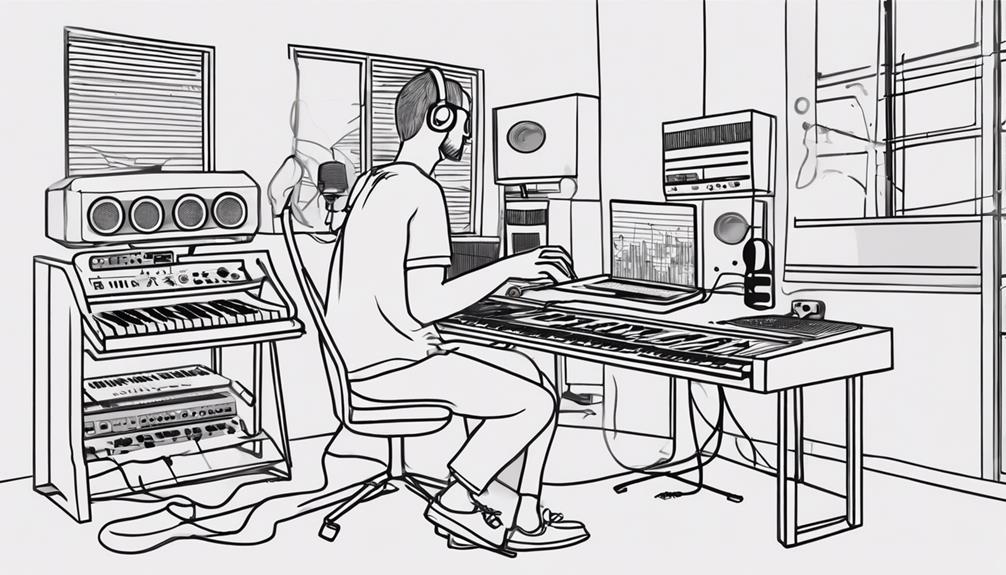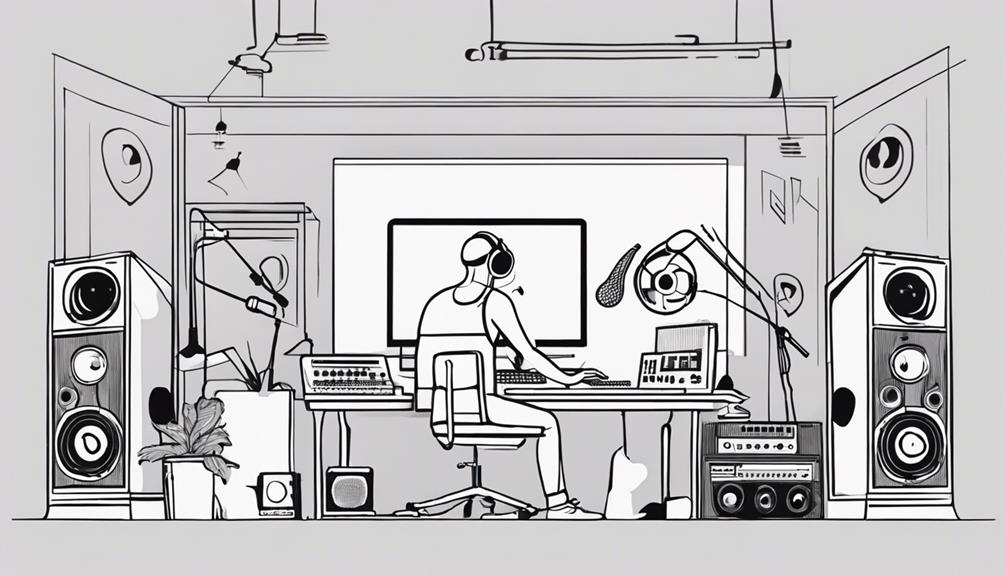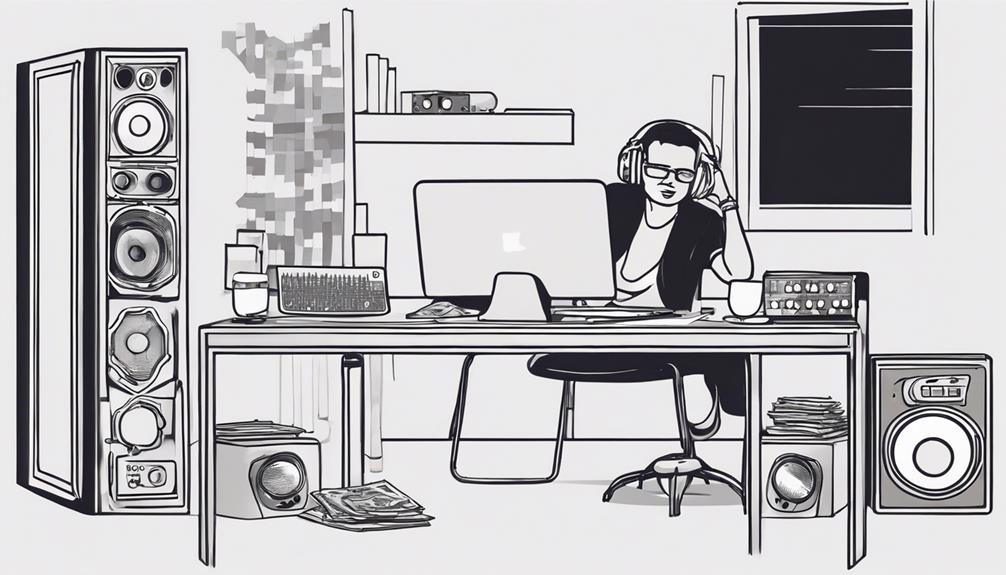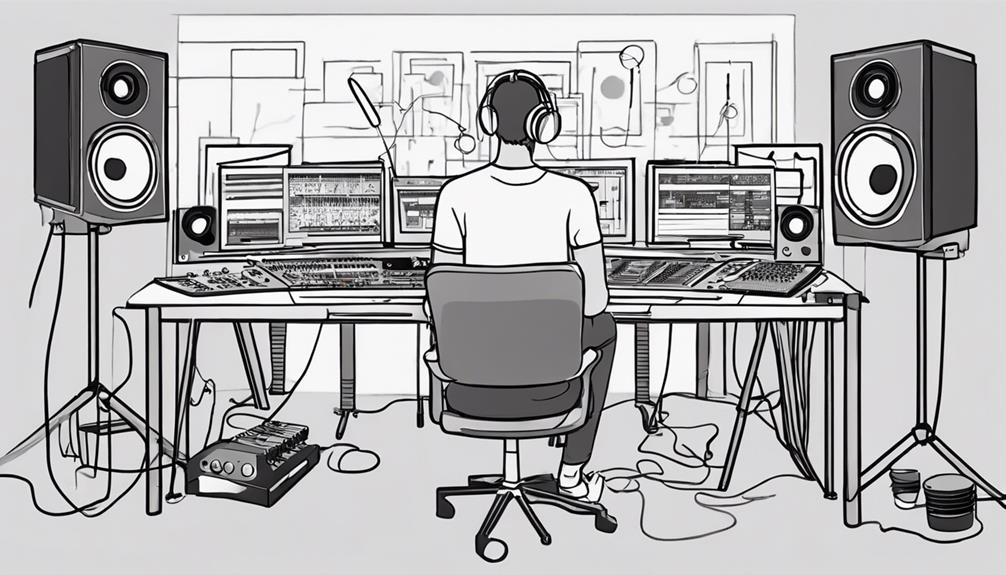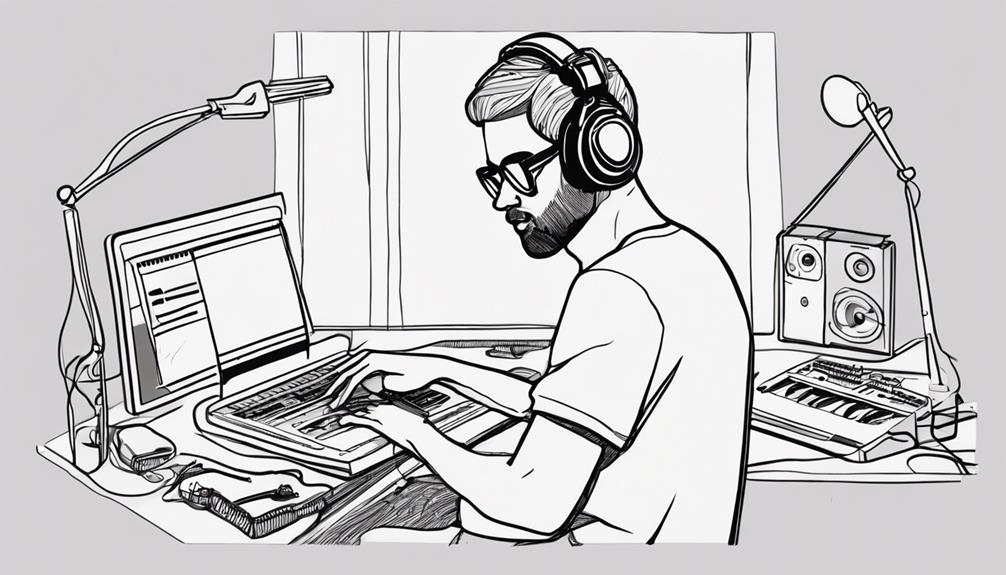To start your music production journey, set up a dedicated space with ideal acoustics. Choose the right equipment like an Audio Interface and studio monitors for accurate sound. Master your Digital Audio Workstation by customizing settings and selecting suitable plugins. Focus on quality recording techniques with proper mic placement and gain staging. Explore different sounds, effects, and genres to craft your unique style. Enhance efficiency with templates and MIDI controllers. Experiment with sound design and mixing techniques. Understanding music theory can help in creating compelling arrangements. Keep refining your skills and sound to stand out! Never underestimate the importance of organization and efficiency in your home music production setup; a clean and streamlined workspace fosters creativity. Additionally, invest time in learning about audio mastering and file management to ensure your projects are polished and professional. Remember, consistency and dedication are key to growing as a producer and establishing your voice in the music world!
Key Takeaways
- Set up a dedicated home studio with proper acoustics.
- Invest in essential equipment like an audio interface and studio monitors.
- Master your DAW settings for optimal performance.
- Focus on quality recording techniques for professional sound.
- Experiment with diverse instruments, effects, and genres for a unique sound.
Setting Up Your Home Studio
When setting up your home studio, choose a dedicated space with ideal acoustics and minimal sound interference. This guarantees a conducive environment for your music production endeavors. Your home studio should be a place where creativity flourishes without external disturbances affecting the quality of your work. Selecting the right location within your home can make a significant difference in the overall sound output of your productions.
Investing in essential equipment like an Audio Interface and studio monitors is vital for achieving professional-grade sound. An Audio Interface serves as the bridge between your instruments and computer, providing high-quality audio inputs and outputs for your recordings.
Studio monitors are specially designed speakers that offer accurate sound reproduction, allowing you to mix and master your music effectively.
Choosing the Right Equipment
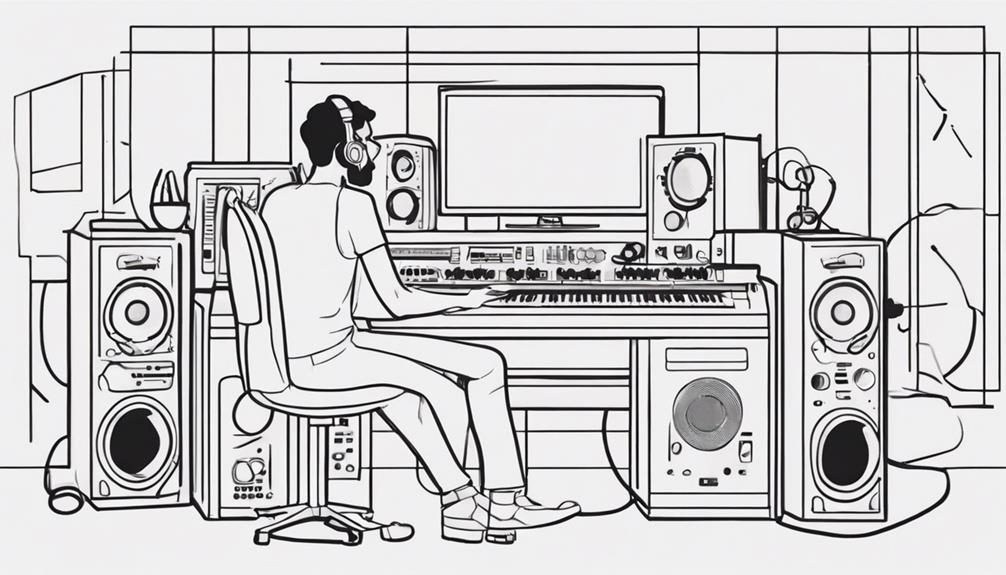
When selecting equipment for your music production setup, focus on essential gear that aligns with your needs. Opt for budget-friendly options without compromising on quality to build a reliable foundation for your studio.
Essential Gear Selection
Selecting the right equipment is essential for your DIY music production setup, starting with a high-quality audio interface. This device serves as the bridge connecting your microphones and instruments to your computer, ensuring clean and reliable audio input.
When it comes to monitoring your music accurately, investing in studio monitors with a precise frequency response is key. A versatile DAW (digital audio workstation) is vital for recording, editing, and mixing your tracks seamlessly.
To enhance the acoustics of your recording space, consider acoustic treatment materials like foam panels and bass traps, which can greatly improve sound quality. Quality microphones, headphones, and a MIDI keyboard are also indispensable tools for a well-rounded home studio setup.
Budget-Friendly Options
Consider exploring affordable options for your music production setup to achieve quality results without breaking the bank.
When selecting studio monitors, look into budget-friendly options like the PreSonus Eris E3.5 or Mackie CR Series for accurate sound representation.
For connecting your instruments and microphones to your computer, opt for affordable audio interfaces such as the Focusrite Scarlett 2i2 or Behringer UMC22.
To record and edit music without overspending, consider using free or cost-effective digital audio workstations like Reaper, Cakewalk by BandLab, or Tracktion T7.
When it comes to microphones, invest in versatile models like the Audio-Technica AT2020 or Shure SM58, which offer quality performance at a reasonable price point.
Lastly, improve the sound quality in your recording space without splurging by exploring DIY room treatment options like making acoustic panels from materials such as rockwool, foam, or moving blankets.
Quality Over Quantity
Prioritize investing in quality equipment tailored to your specific music production needs and budget constraints. When it comes to music production, quality equipment is key in achieving professional results. Focus on factors like audio interface quality, studio monitor accuracy, and microphone versatility to guarantee peak performance.
Research and compare different gear options to find the best fit for your music production goals. Essential equipment such as a reliable computer, DAW software, and studio headphones form the foundation of your setup.
Quality equipment not only enhances the overall sound quality of your music production but also elevates the professionalism of your work. Invest in gear that will serve you well in the long run, rather than opting for quantity over quality.
Mastering Your DAW
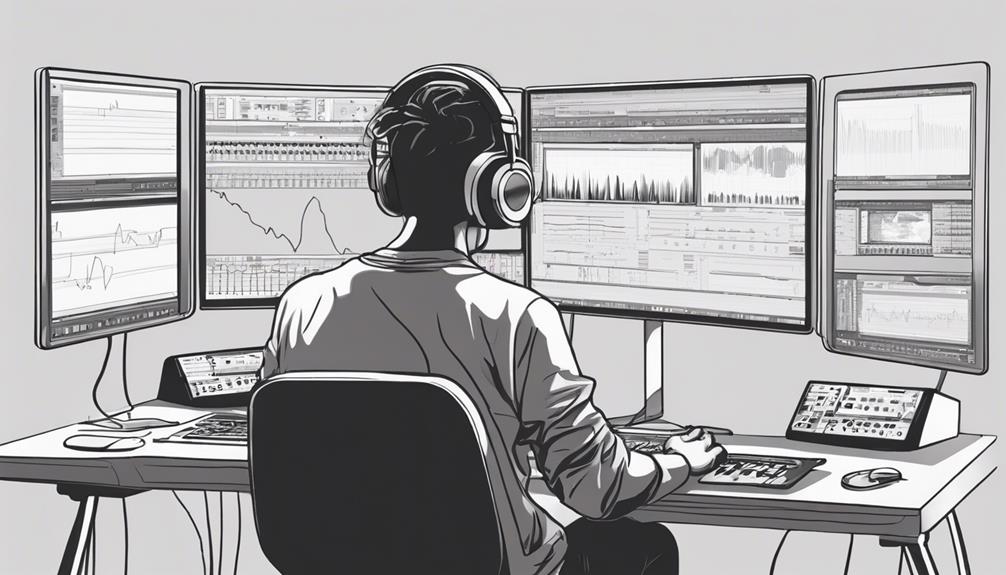
To master your DAW effectively, start by optimizing its settings to suit your workflow and preferences.
Selecting the right plugins is essential for achieving the desired sound and enhancing your tracks.
These key points will help elevate your music production skills and streamline your creative process.
DAW Settings Optimization
When mastering your DAW, optimizing settings such as buffer size, sample rate, and CPU usage is essential for achieving peak performance and high-quality audio recordings.
Adjusting the buffer size helps reduce latency during recording and playback, ensuring smooth audio performance. Setting the sample rate and bit depth correctly is pivotal for capturing audio with clarity and detail.
Customizing DAW preferences for workflows, key commands, and project settings enhances efficiency and streamlines your production process.
Managing CPU usage by freezing tracks, using track comping, and employing offline bounce can greatly improve overall performance.
Additionally, understanding and adjusting audio driver settings within your DAW can enhance audio stability and minimize latency issues, allowing you to focus on creating music without technical interruptions.
Plugin Selection Tips
Consider selecting plugins that align with your music style and production requirements when mastering your DAW. Choosing the right plugins, such as EQ, compression, reverb, and mastering tools, can greatly impact the quality of your music production. Guarantee compatibility with your DAW software for seamless integration and peak performance. Look for reputable developers known for quality sound processing and user-friendly interfaces to enhance your workflow. It's advantageous to explore demo versions or trial periods of plugins to test their functionality and impact on your tracks. When selecting mastering plugins, prioritize features like multiband processing, stereo width control, and loudness maximization to achieve professional-sounding results. Below is a table to help you understand the essential considerations for plugin selection in music production:
| Consideration | Description |
|---|---|
| Music Style | Choose plugins that enhance the characteristics of your music genre. |
| DAW Compatibility | Ensure plugins work seamlessly with your DAW software for efficient usage. |
| Developer Reputation | Opt for plugins from reputable developers known for quality and usability. |
Recording Techniques for Quality Sound
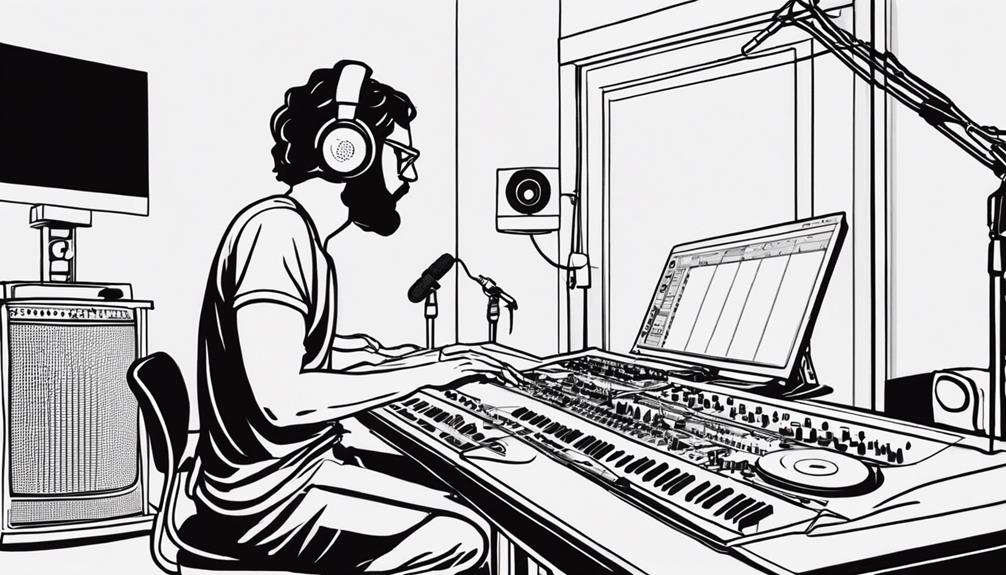
Positioning microphones correctly is essential for capturing high-quality sound when recording music. When setting up your recording space for music production, consider using acoustic treatment such as bass traps and diffusers to control room reflections and enhance sound quality.
Experiment with different microphone placements and techniques to achieve the desired tones and textures in your recordings. For vocal recordings, using a pop filter can help reduce plosives and sibilance, resulting in cleaner audio.
Proper gain staging is also vital to prevent distortion and maintain audio clarity throughout the recording process. By paying attention to these recording techniques and incorporating them into your music production workflow, you can elevate the quality of your sound recordings and create professional-sounding tracks.
Experimentation and attention to detail are key in achieving the best results in your music production endeavors.
Crafting Your Unique Sound
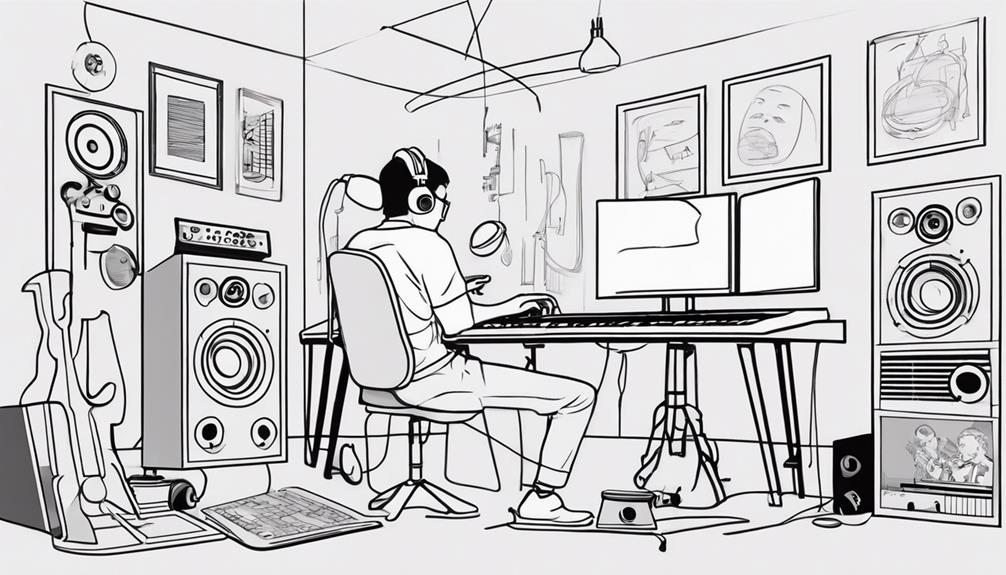
To craft your unique sound, experiment with different instruments, sounds, and effects to develop a distinctive musical style that sets you apart. Incorporate elements from various genres and styles to create a hybrid sound that reflects your unique musical vision. Utilize unconventional recording techniques, such as field recordings or found sounds, to add character and originality to your tracks. Collaborate with other musicians, producers, or artists to infuse new perspectives and ideas into your music, enhancing its creativity and diversity. Continuously evolve and refine your sound through experimentation, feedback, and exploration of new technologies and production techniques.
| Experimentation | Collaboration | Unique Sound |
|---|---|---|
| Try new instruments | Collaborate with | Develop a sound |
| Mix different sounds | other musicians | that is distinctly |
| Explore various effects | and producers | your own |
| Incorporate diverse | Seek input from | Set yourself apart |
| genres and styles | other artists | in the industry |
Understanding Music Theory
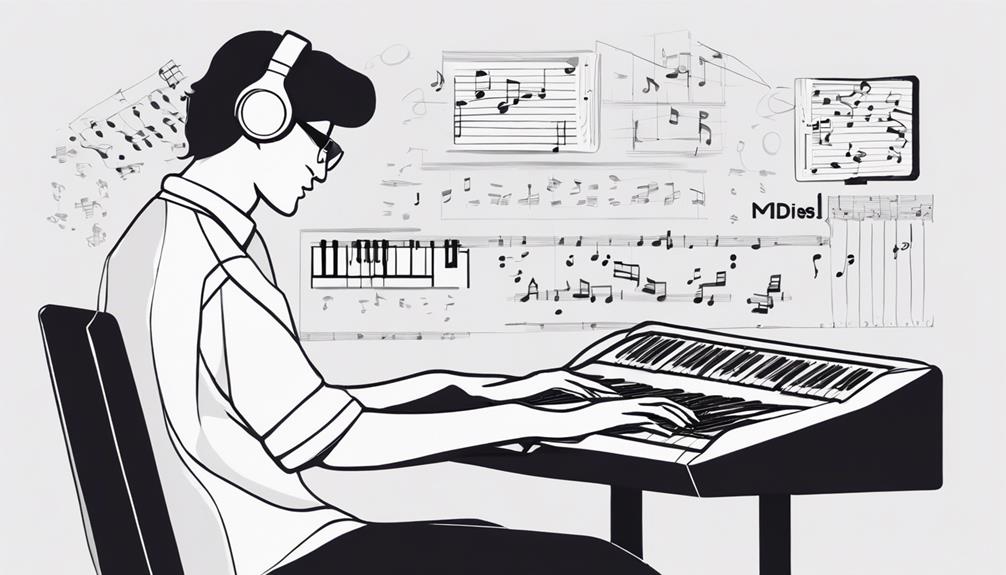
Delving into music theory equips you with a foundational understanding of scales, chords, harmony, rhythm, and melody. Music theory serves as the backbone for music composition, providing a structured approach to creating melodies and harmonies that resonate with listeners.
Understanding harmony in music theory involves learning how different notes sound together and how to construct chord progressions that convey various emotions or moods. By grasping chord progressions, you can create compelling musical arrangements that flow seamlessly from one section to another.
Moreover, mastering music theory allows you to analyze existing music more deeply, helping you appreciate the intricate relationships between different musical elements. This knowledge empowers you to experiment with new sounds, explore diverse genres, and push the boundaries of your creativity in music production.
Enhancing Your Workflow Efficiency
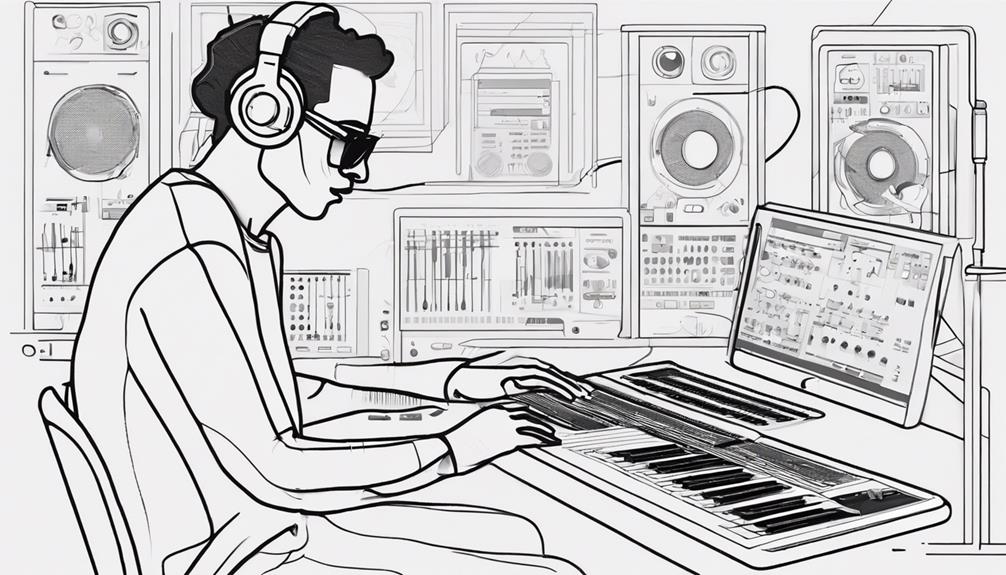
Understanding music theory has laid a solid foundation for your music production journey. Now, let's focus on enhancing your workflow efficiency to optimize your creative process.
Start by organizing your workspace with custom DAW templates and presets that align with your workflow, saving you time and keeping you in the creative zone. Incorporating MIDI controllers can also greatly boost your productivity by providing tactile control over various aspects of your music production, making tasks smoother and more intuitive.
Moreover, delving into sound design basics will empower you to create distinct and engaging sounds that elevate your productions. By mastering sound design techniques, you can infuse your music with depth, texture, and character, setting it apart from the rest.
Additionally, maintaining a well-structured work environment is essential for fostering productivity and creativity. Make sure your workspace is organized and optimized for efficiency, allowing you to focus on what truly matters – making great music.
Experimenting With Sound Design
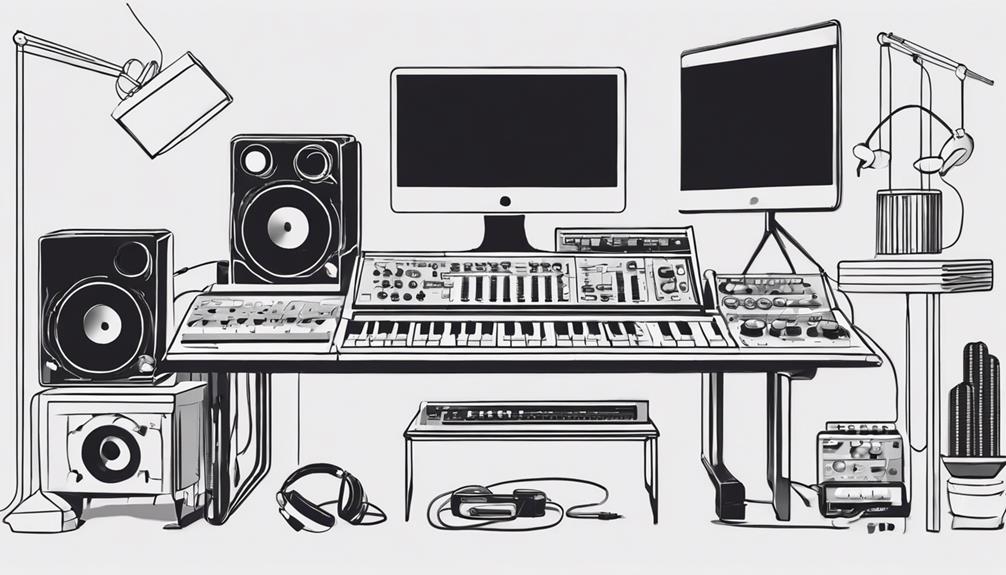
Begin crafting unique and enthralling sounds by exploring different techniques in sound design.
In music production, sound design involves manipulating synthesizers, effects, and samples to create distinctive audio elements that define your style. By experimenting with sound design, you can develop signature sounds that make your music stand out from the crowd. Techniques like adjusting filters, envelopes, LFOs, and effects allow you to sculpt and shape your sounds in innovative ways.
Understanding different sound synthesis methods such as subtractive, additive, FM, and wavetable expands your sonic palette, enabling you to create diverse textures and tones. Leveraging software synthesizers and samplers provides unlimited possibilities for sound design experimentation, giving you the freedom to explore and push the boundaries of your creativity.
Embrace the process of sound design in your music production journey to reveal new sonic possibilities and elevate your tracks to new heights.
Mixing and Mastering Techniques
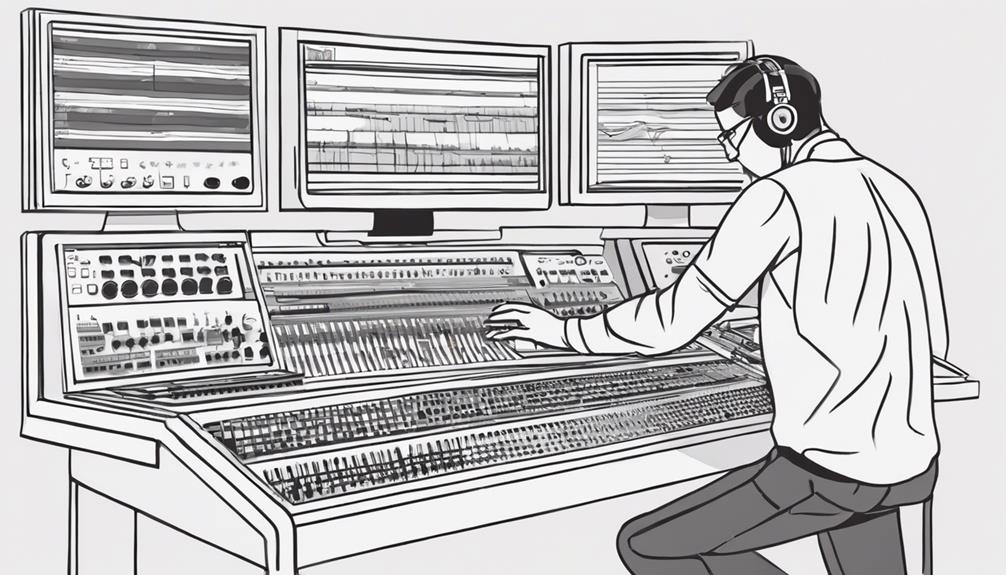
Enhance your music production skills by mastering essential techniques in mixing and mastering. In mixing, you blend individual tracks by adjusting levels, panning, and adding effects to create a balanced sound. Incorporate EQ adjustments to fine-tune frequencies and compression to control dynamics. These techniques help achieve a cohesive and professional mix.
Moving on to mastering, focus on optimizing the overall sonic quality of your music. Use EQ tweaks to enhance clarity, multiband compression for balanced dynamics, stereo widening for a spacious feel, and limiting to guarantee a polished final product.
Mastering guarantees that your music is consistent, clear, and competitive in terms of loudness.
Frequently Asked Questions
How to Do Your Own Music Production?
To do your own music production, learn your DAW, create beats, experiment with melodies, use effects/plugins, and master mixing/mastering techniques. Engage with online resources for continuous improvement. Develop a unique sound by exploring different techniques.
Can I Self Teach Myself Music Production?
You can absolutely self-teach music production! With dedication, practice, and the wealth of online resources available, you can learn at your own pace, allowing for personalized experiences that nurture creativity and deeper understanding.
How Do I Start Myself as a Music Producer?
Explore the world of music production! Begin by immersing yourself in a digital audio workstation, mastering techniques, experimenting with sounds, collaborating, and utilizing resources. Your journey as a music producer starts with passion and persistence.
How Do I Come up With Music Production Ideas?
To come up with music production ideas, immerse yourself in diverse genres and sounds. Draw inspiration from personal stories and emotions. Collaborate with fellow artists. Experiment with techniques like sampling and layering. Stay open-minded to evolve your creativity.
Conclusion
So, now you know the basics of DIY music production. But you might be thinking, 'I don't have the time or money to invest in this.'
Remember, music is a passion that deserves to be nurtured. With dedication and creativity, you can turn your home studio into a place where magic happens.
Don't let excuses hold you back from creating the music you love. Start small, dream big, and let your music speak for itself.

